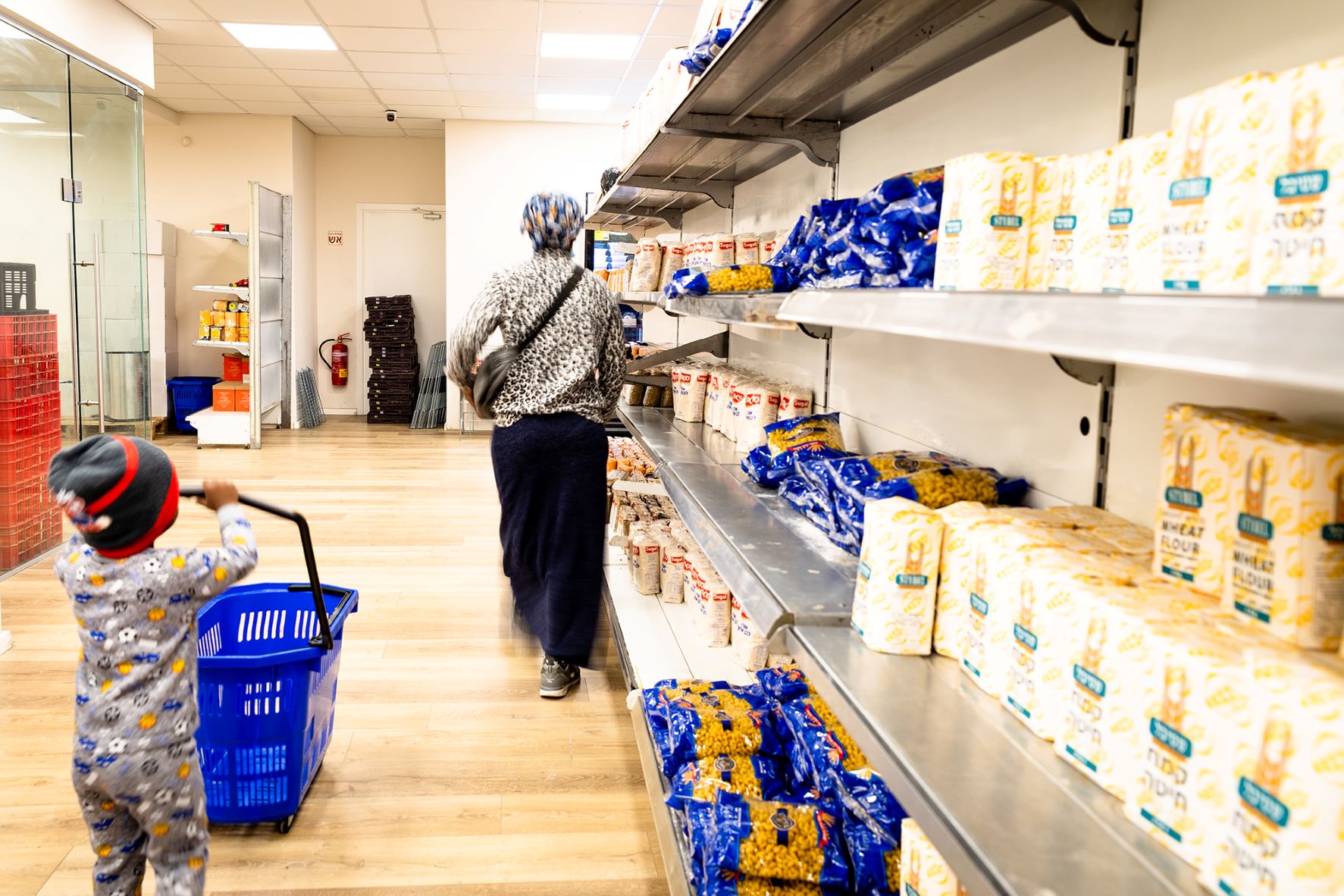$445,000
FOR DONATION
EMERGENCY FUNDS / INNOVATION
PROJECT
Facilitate a program of face-to-face and digital services to improve social connection and support for elderly residents through a cutting-edge Social Impact Bond.
OBJECTIVE
Reduce loneliness and social isolation by 20% for elderly residents over 12 months.
IMPORTANCE
Tel Aviv has the second-largest population of over 65’s in Israel, a country with an above-average prevalence of loneliness. Loneliness adversely affects mental and physical health and is a growing challenge due to an aging population.
THE BACKGROUND
Loneliness is typically defined as the difference between people’s desired social relationships and actual social relationships. Specifically, loneliness is the distress experienced when an individual perceives their social relationships and connections to be deficient in quantity and quality. Loneliness is recognized as having an adverse effect on health and wellbeing. There are two types of loneliness – chronic loneliness and situational loneliness – and two sources of loneliness: social loneliness and emotional loneliness. The correlation between loneliness and age has resulted in loneliness becoming a major social challenge for the elderly; increasingly so due to the growing number of vulnerable older adults. This has generated significant interest among local authorities and civil organizations to address the growing phenomenon of loneliness. However, few solutions have demonstrated robust evidence of impact and the ability to scale.
SOCIAL IMPACT BONDS
Social Impact Bonds (SIB) are innovative financial instruments that raise funds from the private sector to fund prevention programs and improve social outcomes. The SIB (also commonly referred to as a “pay for success” partnership) utilizes capital from private investors to fund social sector or non-profit organizations aiming to reduce the future occurrence of social issues such as unemployment, substance abuse, homelessness, or prisoner recidivism. If the performance of the not-for-profit organization is effective, a cost-saving is enjoyed by the state (or other stakeholders). This saving is quantified and a proportion of it is returned to the investor by the outcome payer.
In this way, there are four direct benefits:
1. The social issue is ameliorated;
2. The investor earns an acceptable uncorrelated rate of return on capital supplemented by a social return;
3. Non-profit organizations are financed using new, sustainable capital which enables them to scale up successful social interventions;
4. The beneficiary organization (e.g. the government) enjoys a cost-saving (with no upfront investment).
Therefore, the SIB uniquely links the monetary return on the financial product with the delivery of positive social outcomes. For every success achieved due to the intervention program, investors are eligible for a predetermined payment. On the other hand, investors bear all financial risk for the program’s failure and will lose all funds invested if the intervention achieves not even a single success. SIBs drive innovation in the social sector by encouraging non-profit organizations to adopt measurement systems that accurately quantify their social performance. Outcome payments are capped to prevent unexpected expenses in the case of a highly successful intervention. And if no success is achieved, the outcome payer faces no expenses while enjoying the benefit of the learnings gained through the process. See Appendix B on how SIBs have been used around the world.
THE NEED
Tel Aviv has the second-largest population of over 65’s in Israel, a country with an above-average prevalence of loneliness. Loneliness among the elderly significantly impairs their quality of life and has shown to have an adverse effect on both physical and mental health. Elderly people present with significantly higher rates of clinical depression and dementia, and a greater need for residential and medical care. Consequently, loneliness among the elderly takes a considerable financial toll on public sector resources. The increased number of doctor visits and unplanned hospital admissions adds to the cost of public health services by up to $11,000 per person. Higher incidences of depression, dementia, and diabetes add up to $1,375 per person. The greater need for nursing care services adds up to $10,720 per person. A growing aging population due to the retirement of “baby boomers” and the increase in life expectancy creates a major new social and economic challenge.
THE PROJECT
Social Finance Israel is working with private investors, the Municipality of Tel Aviv-Yafo, and The Tel Aviv Foundation to develop the first SIB in Israel aimed at reducing loneliness and social isolation. (See Appendix A for more information on Social Finance Israel.) The intervention will target 200 men and women residents over the age of 65 who reside in Tel Aviv and have a loneliness measure of 8 or over (according to the internationally-recognized UCLA scale and assessed by a social worker). Twenty percent of the participants involved in the intervention will be housebound. The intervention will be run by a service provider that specializes in the field of loneliness and the elderly. It will offer a mix of digital and face-to-face experiences to connect elderly people with social and support
services in their community.
These include:
– Access to a local recreation center and leisure activities;
– Access to a ‘Face-Time’ center;
– Mapping local social and support initiatives;
– Video-conferencing with family and friends;
– Cognitive Behavioral Therapy;
– Links to self-help groups (with people of a similar age with similar experiences).
Participants’ loneliness will be assessed three times by social workers: before the intervention begins, after 6 months, and after 12 months at the end of the intervention. The goal in the first 6 months of the intervention is to maintain participants’ level of loneliness. By the end of 12 months, the intervention aims to improve their level of loneliness by 20%. This is equivalent to 1-2 points on the UCLA scale, which represents a significant
change.
THE INVESTMENT
This is the first-ever SIB for the Municipality of Tel Aviv-Yafo. Although expected to significantly improve social outcomes, the innovative nature of this approach means securing a philanthropic partner (or partners) is key to the Municipality’s implementation of the project.
The bond is structured as follows:
Social Finance Israel is currently raising approximately $700,000 of private investment.
The Municipality of Tel Aviv-Yafo and The Tel Aviv Foundation will be the joint outcome payers (assuming program success), as follows:
Contribution from the Municipality of Tel Aviv-Yafo $445,000
Contribution from donor/s through The Tel Aviv Foundation $445,000
TOTAL REQUESTED DONATION: $445,000
(Note that, as a Social Impact Bond, these funds will only be deployed if the
intervention program succeeds in achieving the predetermined outcomes.)
This is a unique opportunity to be part of a new trend of outcomes-based philanthropy which: Links charitable giving to measurable outcomes, Helps to develop best practices, and Tackles one of the biggest social challenges of our time – reducing loneliness among the elderly.
-
The Reuth Tel Aviv Rehabilitation Campus – Establishing the Future of Healthcare
Background More than 60,000 soldiers and civilians have been wounded since October 7 and in the subsequent Swords of Iron War, creating an enormous and unprecedented challenge for Israel’s healthcare system. Thousands of patients are receiving inpatient and outpatient rehabilitation treatment so that they can regain functional independence and return to their lives and […]
-
Providing food security to asylum seekers and undocumented individuals
The Social Grocery StoreBackround: There are approximately 30,000 asylum seekers and people without status living in Israel, most residing in the impoverished neighborhoods of South Tel-Aviv. Asylum seekers and people without status living in Israel experience ongoing financial instability, often resulting in increased vulnerabilities and exposure to many risks, such as homelessness, health and safety, food insecurity, and […]
-
Uplifting and empowering south Tel Aviv teens
The Lin FoundationLin Yavgenia Levkov – A Promising life cut short: Lin Yavgenia Levkov and her mother Irina immigrated to Israel in the height of the 1990s post-Soviet Aliyah wave. Lin’s childhood was difficult; she struggled at school and barely continued her education into high school. But this is where her story took a turn; Lin studied […]




